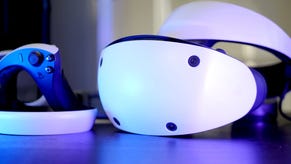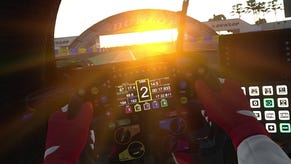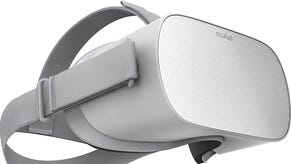Valve explains why Half-Life: Alyx is a VR exclusive
"VR was like the way the gravity gun helped us in Half-Life 2".
It might have taken its sweet time, but a new instalment in Valve's legendary Half-Life series is finally, officially, almost here. But as the shock starts to wear off, there are questions to be answered - with one of the most frequent ones seemingly being, exactly why is Half-Life: Alyx, after a wait of over a decade, exclusive to VR?
Luckily for everyone, Geoff Keighley is on the case, and posed that very question in a video interview with key members of the Half-Life: Alyx team. And the answer, according to Valve's Dario Casali, is simply that VR controllers and headsets permit a degree of gameplay detail that "we couldn't possibly do with a mouse and keyboard".
One example given by Casali revolves around the sort of interactions possible with a simple door. Sure, you can open it and close it in a more intuitive, immersive fashion in VR, but, Casali suggests, it's the additional interactions around that door - opening it a fraction to peer through the gap and see what's on the other side, firing your weapon through the crack, or even slipping a grenade through onto the floor - that makes for a truly unique sort of experience.
"The more we used the controllers and the headset, we realised the amount of interactions this gives, the amount of possibilities these things give us," explained Casali, "When you can track your hands separately from your head, they're all 3D space, all simultaneously tracking and moving, you can't really get that with a mouse and keyboard."
Translating those kind of interactions to a mouse and keyboard, while theoretically possible, would have meant, says Casali, shipping "a game that's missing a lot of those interactions, and they were play-testing so well that we didn't feel like that was a good idea."
Crucially, Half-Life: Alyx was a VR game, before it was even a Half-Life game. As Valve's Robin Walker explained, the project began as an attempt to answer a question frequently asked by consumers following the release of Vive: "Where's the big VR title?". This, Valve realised, was something it was better placed than most to tackle given its resources.
According to Valve's David Speyrer, when ideas for the project were first discussed, the team quickly ruled out multiplayer due to VR's relatively small audience at the time, and soon identified Valve IPs Portal and Half-Life as having the most interesting potential for VR.
However, it was eventually decided that Portal's focus on potentially nausea-inducing flinging wouldn't necessarily be the best fit for VR, while the DNA of Half-Life - story, combat, puzzles, exploration, interaction, and environmental art - could be enhanced in interesting ways. And as the small team experimented with Half-Life mechanics in VR, it discovered "there were enough that were really promising".
As Valve's Robin Walker put it, "In some ways, VR was like the way the gravity gun helped us in Half-Life 2 - it became the tent pole that we could wrap everything around".
Furthermore, according to Walker, the focus on VR helped the team alleviate some of the pressure of expectation when it eventually decided to commit to a new Half-Life game.
"In all honesty, back in 2016 when we started this," laughed Walker, "Half-Life 3 was a terrifyingly daunting prospect, and, I think, to some extent, VR was a way we could fool ourselves into believing we had a way to do this. By starting with VR and then trying to think about Half-Life and how it worked with it and play-testing those...it was really easy to not try and think about the big picture of 'We're making Half-Life 3!' and just focus on 'Let's figure out what people enjoy and let's make forward progress.'"
As for the future, and the question of what might be next for Valve as a game developer and the Half-Life series outside of VR, Speyrer would only say that "We want to put this out and see how the world reacts to it before we make any concrete plans about what we do next".
And the first opportunity to react to Half-Life: Alyx will be when the game, which is compatible with all PC-based VR headsets, releases in March next year.











